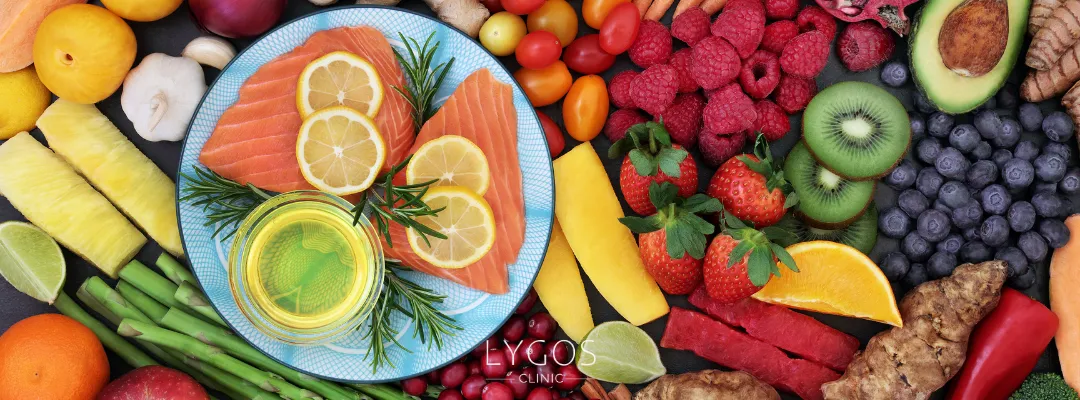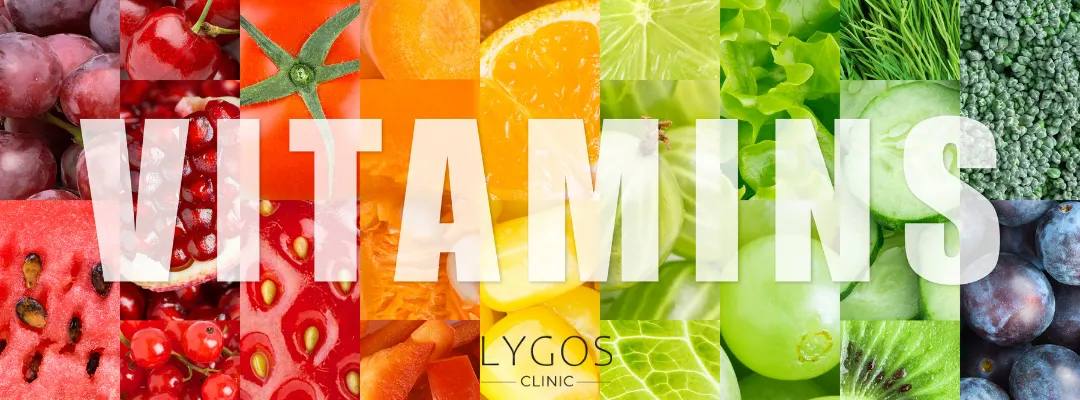Foods Good for the Skin | Vitamin Good for Skin | LYG 2025

Foods Good for the Skin – Vitamin Good for the Skin
It is possible to support skin health both with a balanced diet and by using supplements when needed. Deeply nourishing the skin promotes a youthful appearance, improves skin radiance and delays the formation of wrinkles. Foods good for the skin include rich foods such as avocados, broccoli, carrots, tomatoes, watermelon, kiwi, lettuce, salmon, walnuts and hazelnuts. In addition, consuming olive oil from healthy fats and drinking plenty of water are effective methods that contribute to keeping the skin moisturized and radiant. With these foods, the skin is supported from the inside out and gains a natural glow.
Foods Good for the Skin
Although it is not possible to stop skin aging completely, it is in one’s own hands to mitigate its effects, control the symptoms and have a healthier skin structure. In this sense, supporting and maintaining skin health contributes to a younger and more vibrant skin. What is important in skin care is to consume foods that benefit the skin, to benefit from healthy oils and especially not to neglect drinking enough water. These steps nourish skin health from the inside out, helping you achieve a brighter, stronger and healthier appearance.
What are the Foods Good for the Skin?

Foods that are good for the skin are of great importance for general health as well as beautifying the appearance of the skin. These nutrients help to maintain the skin’s moisture balance, delay the signs of aging and achieve a more vibrant appearance. Here are some of the foods that benefit the skin:
- Avocado: Packed with rich fatty acids and vitamins, it improves skin elasticity.
- Tomato: Provides skin protection thanks to its lycopene content and defends against the harmful effects of the sun.
- Kiwi: Known as a vitamin C storehouse, kiwi strengthens skin health.
- Orange and Grapefruit: Revitalizes skin texture with its high vitamin C content.
- Strawberry and Rosehip: With their antioxidant properties, they help keep the skin young.
- Cherry: Reduces free radicals in the skin with its high antioxidant content.
- Flaxseed: Prevents dry skin thanks to its omega-3 fatty acids.
- Watermelon: Contributes to moisturizing the skin with its abundant water content.
- Broccoli: Rich in vitamins and minerals, broccoli helps repair the skin.
- Carrot: With its beta-carotene content, it supports the skin to look healthy.
- Lettuce: Lettuce, which has a high water content, increases skin moisture.
- Bell Pepper: Rich in vitamin C and antioxidants, it supports skin health.
- Sweet Potato: Helps regenerate skin cells with its vitamin A content.
- Salmon and Other Oily Fish: Omega-3 fatty acids reduce skin inflammation.
- Walnuts and Hazelnuts: Strengthen skin health with healthy fats and vitamins.
- Olive Oil: Contributes to skin nutrition with its antioxidant properties.
- Green Tea: Protects skin health thanks to its high antioxidant content.
- Plenty of Water Consumption: It is very important to maintain the moisture balance of the skin.
By adding these nutrients to your diet regularly, you can support your skin health and get a younger and radiant skin.
Vitamins Good for Skin

The importance of vitamins for maintaining and improving skin health should not be forgotten. While vitamin C stands out as one of the most effective vitamins for the skin, other vitamins provide a healthy appearance by providing the nutrients the skin needs. So, what are the vitamins that are good for the skin?
- Vitamin C: It supports elasticity by increasing collagen production in the skin. It is also a powerful antioxidant and delays skin aging by fighting free radicals. Foods rich in vitamin C include oranges, kiwi, strawberries and peppers.
- Vitamin A: Helps regenerate skin cells and improves skin texture. Vitamin A is especially found in foods such as carrots, sweet potatoes and spinach.
- Vitamin B: B vitamins support the healthy appearance of the skin. B3 (niacin) in particular helps to even skin tone and maintain moisture balance. Whole grains, dairy products and green vegetables contain these vitamins.
- Vitamin D: Vitamin D, synthesized in the body with sunlight, has positive effects on skin health. It can reduce inflammation in the skin and contribute to cell renewal.
- Vitamin E: Reduces the signs of aging by fighting free radicals in the skin. It also supports the healthy appearance of the skin by maintaining its moisture balance. Almonds, avocados and green leafy vegetables are rich in vitamin E.
- Vitamin K: Regulates blood circulation in the skin and helps wound healing. It can also help reduce the appearance of dark circles on the skin. Cabbage, broccoli and green tea are foods that contain vitamin K.
It is important to eat a balanced and varied diet to get enough of these vitamins. Both consuming foods containing these vitamins and taking supplements when necessary will help you achieve a more vibrant and youthful appearance by supporting skin health. Don’t forget to include foods containing these vitamins in your daily life to nourish your skin!
What Should Be Done for Skin Health?

Maintaining and improving skin health is extremely important both aesthetically and for general health. In addition to being resistant to external factors, healthy skin also improves the overall quality of life. Here’s what to do for skin health:
Healthy Nutrition Getting the nutrients the skin needs is one of the cornerstones of skin health. While consuming iron-rich foods increases skin vitality, a balanced diet rich in vitamins and minerals is also important. Fresh vegetables, fruits, whole grains and healthy fats are the main foods that support skin health.
Water Consumption Drinking enough water is essential for the skin to maintain its moisture balance. Consuming at least 8-10 glasses of water a day contributes to a healthier and radiant skin. Water helps remove toxins and increases the elasticity of the skin.
Avoiding Harmful Habits Smoking and alcohol are the main factors that negatively affect skin health. These substances can reduce blood flow to the skin and accelerate the signs of aging. Therefore, avoiding these habits helps the skin maintain its youthful appearance.
Stress Management Stress is an important factor that can lead to increased skin problems. You can try methods such as meditation and yoga to cope with stress, and you can relax your mind by spending time on your hobbies. A relaxed mind also positively affects skin health.
Regular Exercise Physical activity contributes to skin nourishment by increasing blood circulation. Regular walking and exercise make the skin look more vibrant. Sweating during exercise helps to open the pores of the skin and remove toxins.
Sun Protection The sun’s rays are one of the biggest causes of skin aging. Avoiding exposure to sunlight or using protective creams helps prevent skin damage.
The Importance of Breakfast Starting the day without breakfast can negatively affect the skin’s energy intake. A healthy breakfast supports skin health while maintaining energy levels throughout the day.
Green Tea Consumption Green tea positively affects skin health thanks to its antioxidant properties. Drinking 1-2 cups of green tea a day can help the skin maintain its moisture balance and reduce the effects of aging.
By incorporating these simple but effective steps into your daily life to maintain skin health, you can have healthier and radiant skin. Remember, a healthy lifestyle is the key to healthy skin!
You can click on the link to follow our social media content.


